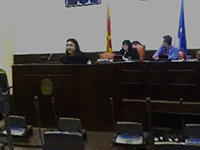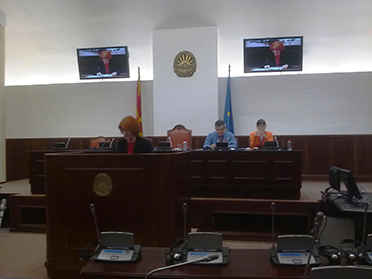Analytica commenting on the draft law amending the Energy law submitted by the citizens’ initiative AMAN

Ana Stojilovska participated in the meeting of the Macedonian Parliament's Committee on economy on 07 February 2013 where the first reading of the draft law amending the Energy law submitted by the citizens' initiative AMAN (13.169 citizens) took place.

Ana Stojilovska participated in the meeting of the Macedonian Parliament's Committee on economy on 07 February 2013 where the first reading of the draft law amending the Energy law submitted by the citizens’ initiative AMAN (13.169 citizens) took place.
The citizens’ initiative AMAN was established as a result of the increase of the energy prices in August 2012. The submitted amendment has two requirements: return of a cheap electricity tariff in duration of 3 hours during the day for the households and releasing the disconnected consumers from the obligation of paying any reimbursement for electricity, heat energy or natural gas services if disconnected. The main aim of draft law is protection of the socio-economic rights of the citizens.
At the meeting beside the members of Committee on economy present were also the citizens’ initiative representatives, the Deputy Minister of economy, members of the Energy Regulatory Commission and the Director of the Energy Agency.
AMAN representatives argued that the draft law will contribute to strengthening the protection of citizens from the energy monopolies as well as to increased social protection having in mind the big proportions of poverty and unemployment in the country. The representatives emphasized the fact that the Energy strategy also stipulates that the increase of energy prices is to be in accordance with the citizens’ standard of living. Further arguments were about the scope of state measures for fighting energy poverty – they are considered to be neither sufficient nor they cover the necessary layer of affected citizens. On the other hand, the institutions’ representatives argued that the material suggested to be changed is already regulated in by-laws and they especially underlined that the energy prices are created by the Energy Regulatory Commission. They also argued that the cheap tariff during the day was repealed for the purpose of reducing the costs for electricity imports since electricity is imported during the day when it is almost 50% more expensive. After the removal of the cheap electricity tariff during the day, the electricity import was reduced by 69%. If it was to be reintroduced, it would cause increase of the electricity price for everyone. The material under Art.2 of the amendment (releasing the disconnected consumers from the obligation of paying any reimbursement for electricity, heat energy or natural gas services if disconnected), is regulated in the Rulebook for heat energy supply from 2012 stipulating that the disconnected consumers living in a building are to pay the fix costs since after the disconnection they remain to be passive consumers. In addition, this was undertaken as a result of the increase of disconnections from the central heating, which lead to higher heat bills for the remaining connected consumers since the supplied heat energy for one building is measured with one measurement device. Few members of the Parliament stressed that there is need of a broader public debate and more information about the subject. However at the end it was concluded that the draft law is not acceptable to go to second reading.
Ana Stojilovska argued for introducing Art.2 of the draft law as a mean for protection from energy monopolies. Her arguments were based on Analytica's research on the Macedonian heat market:
http://analyticamk.org/images/stories/files/report/11047-policyreport_final.pdf
In particular, she stressed the past actions of the dominant actor on the Macedonian heat market Toplifikacija Group (from 1 January 2013 Toplifikacija Group was replaced by Balkan Energy Group) to be proof of reasonable cause for suspicion of the market actor misusing its dominant market position. Also she argued that in a situation in which there is lack of other heating alternatives (as natural gas for the households for example), lack of heat and gas infrastructure, lack of legislation that encourages paying heat bills based on the heat consumption, the dominant market actor is not under pressure to reform itself in order to improve its services. Ana Stojilovska assessed in general the state of the Macedonian heat market as problematic, thus found necessary its thorough reforming. She highlighted that the suggested Art.2 will introduce a safeguard mechanism from possible misuse of the monopolistic position by the energy market actors, thus pressure the energy monopolies to offer better services and protection of the wellbeing of the citizens.
Her full presentation in Macedonian can be found here.
